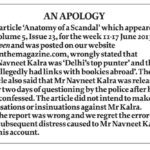Indian Arms Dealers: The Defence Dynasty
Inside the permanent establishment of Indian arms dealers
/wp-content/uploads/2016/05/Thedefencedynasty-lead.jpg)
IT was Christmas eve 2015 in Moscow. Prime Minister Narendra Modi, on his maiden visit to Putin’s Russia, was all set to strike some crucial deals with aerospace and defence companies. Accompanying him was a delegation of CEOs and business leaders from India, among them Anil Ambani of the Anil Dhirubhai Ambani Group, Baba Kalyani of Bharat Forge, Adi Godrej of the Godrej Group, Suvarna Raju of Hindustan Aeronautics Ltd (HAL) and Ravi Ruia of the Essar Group.
At the hotel that hosted the Prime Minister, officials were already at work in the wee hours of the morning to ensure that all went smoothly. At 9 am, Economic Affairs Secretary Shaktikanta Das set the ball rolling at a meeting with the CEOs to discuss and detail the protocol at the Prime Minister’s interaction with the Russians—the nitty gritty of who would say what and when. At 11 am, the delegates were to be put on a special bus for a pre- scheduled meeting of the forum. Officials had already told the media that the meeting was of “high importance”. Modi’s visit had been preceded by a meeting of defence ministers in November to ensure lucrative long-term partnerships and trade deals between Russia and India.
At the meeting, Das listened patiently to the CEOs’ concerns over doing business in Russia’s defence sector. HAL’s Suvarna Raju outlined his worries about price negotiations. “Negotiations with the Russians are too complicated,” the CEOs maintained, in one voice. Suddenly, a man who was not part of the official delegation stepped forward. It was Shiv Vikram Khemka, head of the Gurgaon-based Sun Group. “Let me represent the Russian side, they always check with me on how to tie up and iron out glitches in business deals with companies in India,” he said. The CEOs listened quietly to this strange intervention, as did Das.
Russia’s top aerospace companies, such as United Aircraft Co, were keen on joint manufacturing of components for civil and military programmes and other joint ventures (JVs). There were millions of dollars’ worth of trade deals and long-term business associations at stake, after all. The manufacture of rudders and direction control systems for Sukhoi and MiG with the Tata Group was already under negotiation.
The Confederation of Indian Industry-hosted delegation of honchos urgently needed an intermediary who could understand Russia’s business practices and negotiation processes. In Khemka, some in the delegation had found the golden bridge to smooth talks with the Russian private sector in the two key areas of aviation and defence. Later, Das tweeted: ‘Rusnano and Russian Direct Investment Fund have shown keen interest to invest in NIIF (National Investment and Infrastructure Fund). Further discussion to be held in near future.’
Shiv Vikram Khemka has emerged as one of the key middlemen in the Russia-India defence business sector. He openly claimed that the Russians relied on him to understand the intricacies of the defence trade in India
‘Agents’ had always been an unofficial part of the Indian defence sector, but old practices had given way in the 21st century to smoother methods of lobbying and securing trade deals through interventionists who came with none of the stigma of the old ‘commission agents’.
The now-familiar Abhishek Verma was in jail for his role in the 2006 Navy war room leak case. Sudhir Choudhrie, a one-time Russian brewery owner, had retired to London, and Suresh Nanda, the tainted former Naval officer, had relocated to Dubai. A new clique of smooth and highly knowledgeable players, besides some veterans who had adapted to emerging interception practices in trade deal negotiations, was making a killing in commissions.
Among them was Sanjay Bhandari of Offset India Solutions (OIS). In May 2014, his name emerged among defence sector ‘agents’ in the covert dossiers of Intelligence men and Income Tax officials. Bhandari had arrived as India’s number one arms dealer.
Income Tax officials raided 18 of his premises after keeping him on the radar following a sudden exponential growth of his business in recent years. He was head of OIS which, in 2008, was formed with a paid-up capital of only Rs 1 lakh. Overnight, he had become the top man of a multi-crore venture dealing with at least seven companies, offering ‘consultancy and liaison’ services. OIS Advanced Technology had clinched an agreement with French defence major Rafaut to supply parts for 38 combat aircraft that India was buying from Dassault Aviation. Another JV with LH Aviation was set up to make a new class of high-endurance Medium Altitude, Long Endurance Unmanned Aerial Vehicles (UAVs) in India. Through the JV, OIS was planning to make LH-D- UAVs locally for the Indian market. For that deal alone, Bhandari was suspected to have made a cool Rs 69.38 crore from 35 shell companies between 2009 and 2014.
Bhandari, who was jailed in early 2000 for tax evasion in a case involving the import of foreign cars (his clients then included veteran communist leader Jyoti Basu’s son Chandan Basu), has in recent years become part of Lutyens’ Delhi’s ‘beautiful set’. Income Tax raids on his premises in Delhi in the first week of May have revealed that he has been using his connections to strike lucrative deals and amass huge sums of money. Law enforcement agencies expect a confession in the coming days.
On 8 March 2008, Suresh Nanda, former Lieutenant Commander in the Navy, and his son Sanjeev were arrested in an alleged bribery case. The Nandas have since moved to Dubai but their influence in the power corridors of Delhi has not diminished
Many of India’s new ‘negotiators’ in this sector have one foot in the liquor or hospitality business. It serves as a convenient front for social gatherings and meetings, facilitating smooth negotiations and familiarity with fellow agents worldwide. The new breed of quiet, sometimes understated but well-entrenched defence agents that Bhandari represents were well-educated and suave, some of them Ivy Leaguers in bow ties such as Choudhrie from the previous generation of the parallel Indian defence trade establishment. While they marked a continuation of the same tradition of tacitly accepted ‘dealers’ and ‘commission agents’ in India’s earlier trade deals, they had a lot more panache. Many used the political route to enter and establish themselves in their respective businesses.
The Eton and Wharton alumnus Khemka started out by consolidating his family’s brewing business in Russia, Sun Interbrew. He then set up Sun Natural Resources, a vehicle to invest in the global energy and natural resources sector. All of this was above board. More recently, though, this business magnate has emerged as one of the key middlemen in the Russia- India defence business sector. Khemka, unlike his predecessors, openly claimed, during Prime Minister Modi’s visit to Russia in December last year, that the Russians relied on him to understand the intricacies of the defence trade in India and get details of the ‘players’ in it who negotiated prices for components etcetera before signing on the dotted line.
Khemka’s open and well-heeled bragging took more than just the other CEOs and some in the government quite aback. It embarrassed the Russian government to the extent that it dropped him from the board of the umbrella organisation, Russian Helicopters. His brewery business, too, was shut down. In return for his services of ‘mediation’ with government officials prospecting for JVs and production deals, Khemka secured large orders for his Chandigarh- based company Punwire. The scepticism in some quarters notwithstanding, Khemka continues to peddle his influence while taking up social initiatives and charity work to impress political leaders in Delhi. On his part, the Sun Group chief has left no doubt in the minds of his contacts about his ‘closeness’ to Russian President Putin, the inescapable gateway to Russian aircraft, helicopter and shipbuilding deals worth many billion dollars of business for India.
Nestled along a tree-lined avenue in Lutyens Delhi, Claridges Hotel has in the past had the privilege of hosting the elderly Nizam of Hyderabad on an entire floor, its liveried assistants at attention, ready to respond at the crook of a finger. The Nizam was not the hotel’s only aristocratic guest. Over the decades, governors and high-ranking officials have enjoyed its hospitality. By the 90s, however, the goings-on at the hotel began to acquire sleazy undertones. Political deal-makers frequented the lobby, and some conference spaces were known to be meeting rooms for lobbyists and commission agents. There were some familiar fixtures, among them Ministry of Defence officials who regularly held meetings at the hotel. Suresh Nanda had by then bought both Claridges and Searock Hotel in Mumbai, along with land for an SEZ near the financial capital of the country. He had acquired another hotel in Faridabad. His rivals in the Capital say he acquired all these with the spoils of the Barak Anti Missile System deal between the Indian Armed Forces and an Israeli company. Son of former Navy chief Admiral SM Nanda, Suresh himself was a Lieutenant Commander in the Indian Navy. Investigations into the deal showed that he had been paid Rs 400 crore, with sources abroad depositing the money into various bank accounts in India. On 8 March 2008, Nanda and his son Sanjeev were arrested, along with their chartered accountant Vipin Shah and IRS officer Ashutosh Verma, in an alleged bribery case. Verma had been handling the Income Tax probe against the Nanda family.
By the time the arrests happened, Suresh Nanda had been named as a prominent middleman in several defence deals struck in the past 16 years through his Crown Corporation and Dynatron Services Pvt Ltd. The man who made ‘kickbacks’ a familiar word to Indians was named in CBI FIRs, had his passport revoked and featured in every Income Tax intelligence roster on defence deals. In an FIR filed in October 2005, the CBI mentioned large payments from MTU Aero Engines, an Israeli firm, into bank accounts of Nanda’s Dynatron Services. In October 2006, it filed an FIR naming Suresh Nanda among others alleging huge kickbacks in the purchase of Barak missiles from Israel for the Indian Navy. In the same month, Nanda was named in another FIR in the purchase of Armoured Recovery Vehicles. Nanda was termed an agent for one of the bidders, and was accused of accepting commissions from the company.
Sudhir Choudhrie shuttles between India, Russia and Israel, conducting some of the world’s biggest defence deals. In 2014, the UK’s Serious Fraud Office arrested him and his son Bhanu in connection with the suspicious growth of their business
Connections in all the right places, including in political circles, extricated the Nandas from a life of stigma here. They moved to Dubai, but just how deep the Nandas ‘connections’ run was revealed at a recent event to commemorate the birth anniversary of Suresh Nanda’s father, the late Admiral SM Nanda. Navy chief Robin K Dhowan was chief guest and several top-ranking officers were in attendance. It was a clear signal that the clout of the Nandas had not diminished very much.
Another player, Sudhir Choudhrie, has survived at least two CBI probes into his activities, both of which had to be dropped for lack of credible evidence against him. Stationed in London, Choudhrie—‘Bunny’ to his friends—had begun using his uncle BK Kapoor’s connections in HAL to his advantage many years ago. His reputation as a mover and shaker of defence deals grew with time. Soon, the myth became the man. No major deal could fructify without the assent of the country’s longest lasting arms dealer, a man capable of swinging huge fortunes. Choudhrie is a jet-setter, shuttling between India, Russia and Israel as the architect of some of the world’s biggest defence deals. Although he was probed by the CBI for alleged payment of bribes in securing a contract for upgrade of artillery guns, and he also figured in the Barak missile scandal of 2006-07, both cases had to be closed later for want of evidence. As recently as 2012, the CBI named Choudhrie on a list of about two dozen ‘undesirable contactmen’ who were suspected of manipulating government contracts. His name was black-marked and ministers and officials were cautioned not to maintain any contact with him.
Choudhrie and his family still allegedly use philanthropy as a cover and are major donors to the Liberal Democrat Party. But in February 2014, the UK’s Serious Fraud Office (SFO) arrested him and his son Bhanu in connection with the unbridled and suspicious growth of his hospitality business and other interests in the UK, to which he moved in 2002. A formal investigation into possible bribery and corruption at Rolls-Royce in China and Indonesia, though, could not stick. People in the know say he is an unashamed name dropper and brags about his closeness with Israeli Prime Minister Netanyahu, Russian President Putin as well as UK Prime Minister David Cameron.
On top of the notoriety charts in earlier times, was Abhishek Verma, currently in Tihar Jail. He was famous in the back avenues of the Capital’s power circles and the local point man for SIG Sauer, a German arms supplier, when its owner Michael Lüke and its CEO Ron Cohen would visit Delhi. Going by diary jottings, Verma took them to meet a ‘Mr Gandhi’ at the latter’s residence; the indications were that this referred to a member of the political family by that name, but media investigators were unable to verify whether the mystery host was Rahul, Varun or anybody else. When the news broke out, Rahul Gandhi’s spokesperson told the media that although he was in Delhi, no such meeting had been scheduled that day. Varun Gandhi also denied a meeting with him. But on that day, Lüke and Cohen had met Major General RK Rana, inspector general of the Special Frontier Force (SFF), an agency that operates under India’s external intelligence agency, the Research & Analysis Wing (RAW).
Currently in Tihar Jail for his role in the 2006 Navy war room leak case, Abhishek Verma, a brash operator, was famous in the back avenues of the Capital’s power circles and the local point man for SIG Sauer, a German arms supplier
Verma was a brash operator. Often spotted with foreign women on his arm, he would host lavish booze parties for those who mattered at rented farm houses on the outskirts of Delhi. Well-known businessmen vied to be invited and given social ‘favours’. His flamboyance, however, alerted the Income Tax authorities. Verma had been working for SIG Sauer since 2009, but it was an open secret that his business was really carried out by his Romanian partner Anca Neacsu. He has been arrested thrice since 2012, and it was the 2006 Navy war room leak case that put him in the slammer.
It was between 5 and 7 December 2012 that Verma hosted Lüke and Cohen in Delhi and helped them meet a plethora of politicians, bureaucrats and officials of the armed forces. Lüke and Cohen also met senior ministers in the UPA Government. The year 2012 was also when the Italian firearms manufacturer Beretta got its large Ministry of Home Affairs (MHA) contract for assault rifles.
In a studied contrast to Verma, Bhupinder Singh who did not enjoy any major political clout. Tusky, as he was known in arms deals circles, was a sober South Delhi man who specialised in contracts for small equipment needed by the police and paramilitary forces, under the MHA. An alumnus of Lawrence School, Sanawar, the buck-toothed Tusky was the son of a retired Army general and a keen golfer, often seen at the Army Golf Club in Delhi. He evoked visions of a laidback, cultured country squire from England. Both the Home and Defence ministries prohibit the role of agents in defence deals. In theory, all negotiations are conducted directly with original equipment manufacturers (OEMs). In reality, Tusky’s discreet parties at his Vasant Vihar home were known to officials. Around 2009, Tusky became Beretta’s representative in India, and the contract the company was awarded surprised everyone for the speed of its execution. Delivery took less than three years, highly unusual by India’s lax acquisition standards.
Tusky and his son Udai Singh were the only arms agents present on all four days of the Border Security Force’s weapon trials held between 17 and 20 May in 2012. Beretta signed the MHA contract worth over Rs 200 crore for 34,377 carbines. This catapulted Tusky into the big league of arms dealers such as Suresh Nanda and Mohinder Singh Sahni, named by the CBI as an agent in the Krasnopol guided munitions case.
Delhi-based Mohinder Singh Sahni and his Mokul Group were put on CBI’s watchlist some time back, despite his low profile, on suspicions of his involvement in fixing deals for Rheinmetall Defence. In 2005, Sahni and Vipin Khanna, a London-based arms agent, were formally charged for allegedly earning commissions to facilitate the supply of 1,200 anti-material rifles from South Africa’s Denel. Active in Russia, Sahni was caught on tape by a weekly magazine in 2006 for approaching the then BJP President Bangaru Laxman for an arms deal. The CBI also drew links between him and tainted Ordnance Factory head Sudipta Ghosh.
MS Sahni and his Mokul Group were put on CBI’s watchlist on suspicions of involvement in fixing deals for Rheinmetall Defence. He was caught on tape in 2006 for approaching then BJP President Bangaru Laxman for an arms deal
Sunder Mulchandani worked for 20 years as a business professional, and was the chief of Allied Signal Inc, a manufacturer of aerospace components that later merged with Honeywell International in 1999. An acolyte of Suresh Kalmadi, he was instrumental in introducing Formula 1 boss Bernie Ecclestone to Kalmadi and Manoj Gaur, executive chairman of the once-powerful Jaypee Group. The Congressman and his wingman Mulchandani convinced the Gaurs, known for their proximity to then UP Chief Minister Mayawati, to build the race track in Greater Noida. An agreement was quickly inked between JP Associates, Kalmadi’s son Sumeer’s Sulbha Realty, and Trackwork International Pvt Ltd, owned by Mulchandani. That rang in JPSK, Jai Prakash Sumeer Kalmadi, which made an agreement with the Fédération Internationale de l’Automobile (FIA) for holding F1 race in India. Under intense media scrutiny following the Commonwealth Games scam, the Kalmadi family withdrew from JPSK and it was converted into JPSIL, a subsidiary of the JP Group. More recently, though, Mulchandani is busy piloting his new defence business by racing his Argus Integrated Systems into the world of rich defence deals. Mulchandani was recently engaged as a lobbyist for Saab Group, a Swedish defence major, for setting up meetings between officials and Saab’s CEO and President Håkan Buskhe to pitch for Gripen fighters in place of the French Rafales.
If there is a single name that has come to define the public image of defence dealmakers, it is Chetan Seth, the cigar-chomping, bespectacled, affable socialite. A cigar importer, Seth is active in the current regime, promoting smaller weapons makers from Poland and the Czech Republic and other former Slovak countries for MHA orders. Much of his business, rivals claim, is conducted at his house where he hosts parties attended by MoD brass and representatives of these companies.
If there’s a single ‘player’ who has come to define the public image of defence dealmakers, it is Chetan Seth, the affable socialite. He is active in the current regime, promoting smaller weapons makers from Poland and Czech Republic
IT WAS IN 2006 that Chetan Seth’s Page 3 presence as a socialite receded and his role as the head of Optic Electronics and the Chemon Group came to the fore. The year earlier, the MoD had blacklisted 118 companies, including suppliers and vendors, and Seth’s company was among them. It had placed an export order with the Ordnance Factory Board for periscope observation devices. But the order had major quality issues. Seth then said that he had not received a ‘show cause’ notice before the ban and that the MoD was harassing small and medium units even while soft-pedalling similar issues with big firms that were involved in shady dealings. The social connections helped keep his jet- setting profile intact. But years later, in 2012, when the Tatra truck deal scandal broke, Lieutenant General VK Jetley’s brother Colonel Virender Jetley turned out to be employed by Bumar India, a JV between Bumar Poland and Seth’s Chemon Group. The latter was a player in the Armoured Recovery Vehicle tender. His company indigenised drivers and periscope sights, adjustable seats and radios at the Ordnance Depot in Kirkee. Meanwhile, Optic Electronics was operating in a Noida SEZ, importing surplus parts from East European depots, giving them a snazzy makeover and then re-exporting them at a 500 per cent markup. Optic, in a well-oiled modus operandi, would import day sights for each WZT-3 ARV for $5,000 and then clean and touch up the stained and rusty parts and re-export them to Bumar Poland for $25,000 each.
The trail of hush-hush deals by entrenched, undercover middlemen in India’s defence establishment is a complex story that is still unravelling. And as the rotating blades of the VVIP chopper deal with AgustaWestland gain speed, they could hack through the kickback links between politicians, businessmen and the intermediaries sharing the illegal multi-million-dollar commission booty in the nation’s defence sector.

/wp-content/uploads/2025/03/Cover-ABVP.jpg)














More Columns
Swedish whistleblower’s daughter to launch Chitra Subramaniam’s Boforsgate Ullekh NP
Keerthy’s Crackling New Avatar Kaveree Bamzai
Inside the World of Bad Boys Kaveree Bamzai